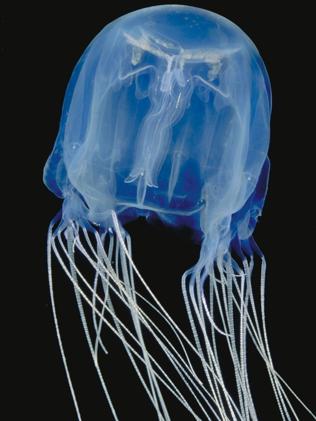SCIENTISTS have analysed deadly box jellyfish venom for the first time, paving the way for better antidotes and studies into whether its toxins can be used in the fight against cancer.
The Queensland researchers discovered a new family of toxins in the venom of the world’s largest and deadliest box jellyfish, the Chironex fleckeri, found in the Australian tropics.
Biochemist Jason Mulvenna, of the QIMR Berghofer Medical Research Institute, said the analysis would lead to more studies into whether any of the toxins could be developed into new cancer drugs.
“We’ve got a lot of cancer cell lines that we test various toxins against to see if they can be used as anti-cancer agents,” Dr Mulvenna said.
“It’s early days. You never know where it’s going to lead.”
Queensland researchers are also studying the venom of spiders and cone snails, hopeful of creating new classes of powerful painkillers.
Dr Mulvenna said the detailed chemical analysis of the box jellyfish venom, undertaken over about 12 months, found it was made up of about 200 proteins.

A box jellyfish Source: Supplied
Box jellyfish toxins act rapidly. Major stings are capable of causing a person’s heart to stop within a few minutes. Most of the venom is found in the tentacles of the jellyfish, which can be up to 3m long.
Dr Mulvenna said scientists were hopeful the analysis would eventually lead to a better therapy for treating box jellyfish stings.
“If we take these proteins and find out what they do then we might be able to block their action and come up with a more effective treatment, something that you could take with you in a boat so that if you’re stung, you could rub it on your skin, perhaps.
“This is the first step.
“If you don’t know what’s in there, you don’t know how to treat it.”
About 70 box jellyfish deaths have been reported in tropical Australia since records were first kept in the 1880s.
The research into the jellyfish venom is published in the journal BMC Genomics.

Biochemist Jason Mulvenna says scientists are hopeful the analysis will eventually lead to a better therapy for treating box jellyfish stings. Picture: Marc Robertson
